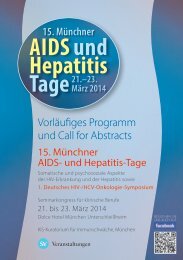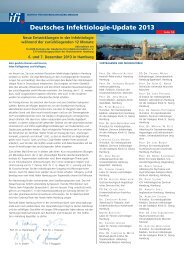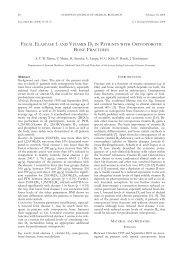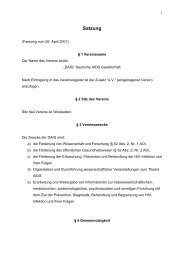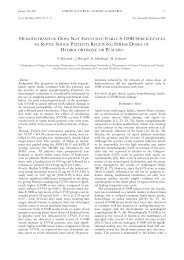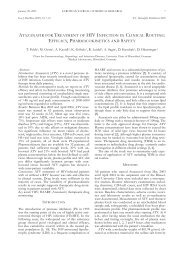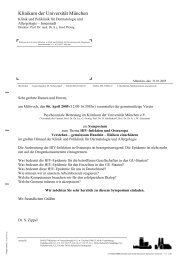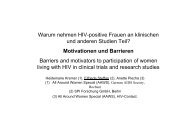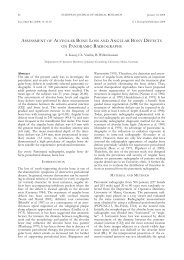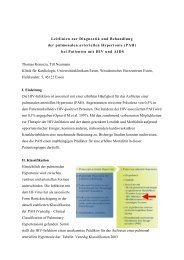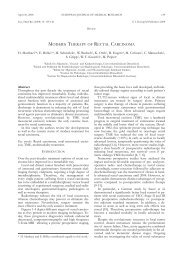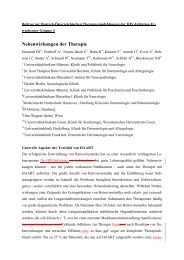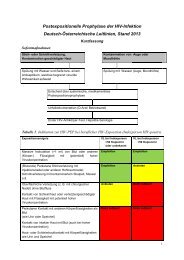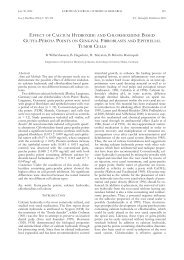European Journal of Medical Research - Deutsche AIDS ...
European Journal of Medical Research - Deutsche AIDS ...
European Journal of Medical Research - Deutsche AIDS ...
Create successful ePaper yourself
Turn your PDF publications into a flip-book with our unique Google optimized e-Paper software.
June 27, 2007 EUROPEAN JOURNAL OF MEDICAL RESEARCH<br />
39<br />
year-olds) regarded <strong>AIDS</strong> as being one <strong>of</strong> the most dangerous<br />
diseases. This figure declined steadily. In 2006 only 29% <strong>of</strong><br />
the general and 43% <strong>of</strong> the young population rated <strong>AIDS</strong> as<br />
one <strong>of</strong> the most dangerous diseases. Since the mid 1990s between<br />
70% and 80% <strong>of</strong> the general as well as the young population<br />
is certain about the fatal course <strong>of</strong> <strong>AIDS</strong>. In 2006 6% <strong>of</strong><br />
young people were holding the view that <strong>AIDS</strong> could be<br />
cured.<br />
Experience with condom use among the German population<br />
has spread substantially since the start <strong>of</strong> the <strong>AIDS</strong> education<br />
campaign. In 1991 76% <strong>of</strong> the 16 to 65 year-olds and 67% <strong>of</strong><br />
the 16 to 20 year-olds had experience with condoms. This<br />
proportion increased to 90% percent in the general and to<br />
76% in the young population in 2006.<br />
A substantial increase in condom possession can be determined.<br />
In 1991, 32% <strong>of</strong> the general and 37% <strong>of</strong> the young<br />
population said they had condoms at home or with them. In<br />
2006 46% <strong>of</strong> the general population and 68% <strong>of</strong> the younger<br />
people had condoms available.<br />
<strong>AIDS</strong> is considered to be far less <strong>of</strong> a threat than in the past<br />
decade. Nevertheless, the majority <strong>of</strong> the German population<br />
still views HIV/<strong>AIDS</strong> as a fatal disease. Preventive health<br />
care aims at achieving and maintaining a high level <strong>of</strong> public<br />
knowledge about HIV/<strong>AIDS</strong>. Promoting safer sex constantly<br />
has lead to increased experience with and availability <strong>of</strong> condoms<br />
especially in young people.<br />
A.35 (Poster)<br />
Knowledge, attitudes and behaviour with regards<br />
to HIV and STIs among young adults in Germany,<br />
Poland Austria, Slovak Republic, Italy and<br />
Slovenia – a BORDERNET cross border survey<br />
Sokolowski S. 1 , Steffan E. 1 , Arsova Netzelmann T. 1<br />
1 SPI Forschung gGmbH, Berlin, Germany<br />
Objectives: Young people’s risk exposure to HIV/<strong>AIDS</strong> and<br />
STI is confirmed not only by recent data on new HIV infections,<br />
but also by a variety <strong>of</strong> socio-demographic, cultural and<br />
psychosocial factors related to the age <strong>of</strong> experimentation and<br />
unsettled search <strong>of</strong> (sexual) identity. Carried out in the frame<br />
<strong>of</strong> the EC-funded Project BORDERNET, the survey aims to<br />
identify sexual risk indicators related to knowledge, attitudes,<br />
sexual practices and cross-border mobility <strong>of</strong> <strong>European</strong> young<br />
adults from 6 EU member states.<br />
Methods: A KAB survey comprising additional items on<br />
cross border mobility conducted through a self-administration<br />
questionnaire. Based on preliminary defined selection criteria<br />
<strong>of</strong> risky youth venues, 1085 young adults aged 18 to 25 years<br />
were recruited in border regions <strong>of</strong> Austria, Germany, Italy,<br />
Poland, Slovakia and Slovenia.<br />
Results: Young adults exhibit in general high basic knowledge<br />
<strong>of</strong> HIV/STIs. At the same time various uncertainties exist<br />
related to widespread myths <strong>of</strong> infection and protection,<br />
which influence respondents from the new EU member states<br />
stronger. About a quarter (26%) <strong>of</strong> the young adults (with a<br />
considerable share <strong>of</strong> Germans among them) does not have information<br />
about the availability <strong>of</strong> anonymous and free-<strong>of</strong>charge<br />
HIV counselling and testing <strong>of</strong>fers. This may impact<br />
negatively their help-seeking behaviour. Gender and crosscountry<br />
comparisons show that the young women and the respondents<br />
from old EU member states (especially the Austrians<br />
and the Germans) tend more to single-partner relationships<br />
as a risk management strategy and state to chose more<br />
<strong>of</strong>ten the “no condom, no sex” self-protective behaviour.<br />
Young men, as well as respondents from Mediterranean countries<br />
(Italy, Slovenia) predominate among those with multiple<br />
sexual partners, and partly with condom-unfriendly attitudes.<br />
Nevertheless, men in general report more <strong>of</strong>ten condom use<br />
than women and rely more on their assertiveness skills at the<br />
condom negotiation.<br />
Conclusions: The identified narrow link between condom use<br />
and prevention <strong>of</strong> unwanted pregnancy confirms unambiguously<br />
the importance <strong>of</strong> integrative prevention approaches,<br />
which embed the HIV/<strong>AIDS</strong> and STIs education into the<br />
wider frame <strong>of</strong> the sexual and reproductive health <strong>of</strong> young<br />
adults.<br />
A.36 (Poster)<br />
HIV prevention among MSM in the Ukraine<br />
Traute A. 1<br />
1 Connect plus, Berlin, Germany<br />
An Ukrainian-German working group conducted a study<br />
among HIV-positive and HIV-negative MSM (men who have<br />
sex with men) per in-depth interviews and questionnaires between<br />
August and November 2006. The aim was to obtain information<br />
about prevention deficits and ways to HIV prevention<br />
among MSM in the Ukraine - a work that has long been<br />
neglected and only recently is conducted with the aid <strong>of</strong> international<br />
donors. 16 in-depth interviews about all aspects <strong>of</strong><br />
sexual experience and sexual behaviour, safer sex and the perceived<br />
attitude <strong>of</strong> Ukrainian society and MSM communities<br />
were conducted. Parallel, 200 MSM were interviewed per paper<br />
and pencil questionnaire about the same aspects. During<br />
the recruiting phase, stress was laid on the goal to recruit<br />
MSM from various social sub-groups (MSM identified as gay,<br />
bisexual, hidden, with incarceration experience, sex workers).<br />
The in-depth interviews were performed by trained peers <strong>of</strong><br />
the respective sub-group in order to allow access to that<br />
scene. The project also served as capacity building measure<br />
for the Ukrainian project partners.<br />
One <strong>of</strong> the main results was that risky sexual behaviour<br />
takes place, when sex partners feel being or are discriminated<br />
by the society because <strong>of</strong> to their sexual preferences, or by the<br />
MSM community due to their HIV-Status. In these cases, for<br />
example no communication about safer sex and protection<br />
steps takes place in sexual situations. Psychological factors <strong>of</strong><br />
risky behaviour are perceived chronic stress (tension), perceived<br />
discrepancies between own knowledge, own beliefs<br />
and principles and performed behaviour. The group <strong>of</strong> nottested<br />
MSM can be silhouetted against tested MSM with regard<br />
to anonymity <strong>of</strong> sexual contacts and lacking protective<br />
behaviour. Knowledge deficits seem to play no role in risky<br />
behaviour. In general, initiation <strong>of</strong> sex contacts via internet<br />
has become widespread. Prevention measures should first <strong>of</strong><br />
all be implemented on accordant websites.<br />
The study was supported by UN<strong>AIDS</strong> (No. IR.UKR.USC.<br />
226.UA.04.G (999.51)) by funds from the German Federal Ministry<br />
<strong>of</strong> Health, and was scientifically supervised by a member <strong>of</strong> Public<br />
Healt Group at Centre for Social Studies (Wissenschaftszentrum)<br />
Berlin.



